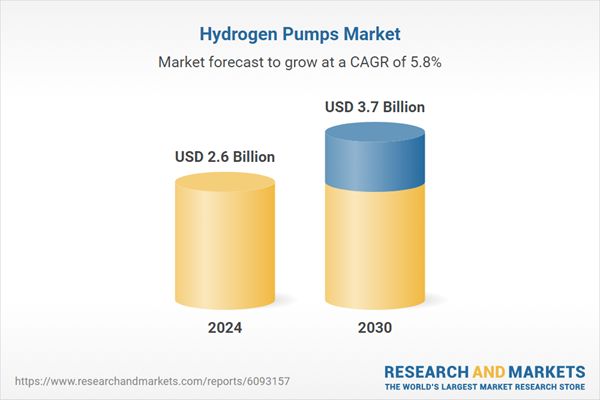Speak directly to the analyst to clarify any post sales queries you may have.
10% Free customizationThis report comes with 10% free customization, enabling you to add data that meets your specific business needs.
Technological improvements in hydrogen storage, dispensing, and compression have also made pump systems safer, more efficient, and cost-effective. Major automakers are scaling investments in hydrogen mobility, while countries like Japan, Germany, South Korea, and the United States are expanding hydrogen station networks. Additionally, hydrogen use is expanding in industrial sectors such as steel production and chemical refining, further increasing the need for reliable hydrogen pump systems. These intersecting trends are contributing to steady market expansion across both transportation and industrial domains.
Key Market Drivers
Government Policies, Environmental Regulations, and Decarbonization Goals
A key driver of the global hydrogen pumps market is the strong policy support and regulatory push toward decarbonization and clean energy. Governments across the world are implementing strategic initiatives to transition away from fossil fuels, with hydrogen playing a central role in these long-term climate action plans. Regions such as the European Union, North America, and Asia-Pacific have introduced roadmaps and funding mechanisms to accelerate hydrogen infrastructure deployment, including the development of refueling stations equipped with advanced hydrogen pumps.The European Commission’s hydrogen strategy, for example, targets 40 GW of renewable hydrogen capacity by 2030, while Japan and South Korea are rapidly growing their hydrogen-powered vehicle fleets and supporting infrastructure. These developments require large-scale installation of hydrogen pumps to compress and distribute hydrogen efficiently and safely, thereby positioning pump systems as a fundamental enabler of the hydrogen economy.
Key Market Challenges
High Infrastructure Costs and Economic Viability
A major hurdle for the hydrogen pumps market lies in the high cost of hydrogen infrastructure development. Installing hydrogen fueling stations - particularly high-pressure configurations suited for FCEVs - can cost upwards of $1 million, with hydrogen pumps accounting for a significant portion of that investment. These costs are compounded by complex engineering requirements and the need for specialized materials to ensure durability and safety.Additionally, hydrogen fuel remains relatively expensive compared to fossil fuels and electric alternatives. The economics of hydrogen production, especially green hydrogen derived from renewable-powered electrolysis, are still evolving, affecting its competitiveness and adoption rate. In regions with low hydrogen vehicle penetration, infrastructure utilization remains suboptimal, making it challenging for operators to achieve return on investment. This infrastructure-adoption gap continues to slow down market expansion and poses a significant challenge for pump manufacturers and investors.
Key Market Trends
Shift Towards Green Hydrogen and Integration with Renewable Energy Sources
An important trend shaping the hydrogen pumps market is the increasing production of green hydrogen using renewable energy. As countries pursue aggressive emissions reduction targets, green hydrogen is gaining preference over grey hydrogen due to its low environmental impact. This transition is influencing pump design and functionality, as green hydrogen projects often require flexible and modular compression systems.Large-scale projects in Europe, Australia, and the Middle East - such as the NEOM initiative in Saudi Arabia and Europe’s Hydrogen Backbone plan - are deploying renewable-powered electrolysis plants that rely on advanced hydrogen pump systems for storage and distribution. In parallel, mobile and decentralized pump units are being developed to support off-grid hydrogen production, particularly in remote or renewable-rich regions. These systems are tailored to work under fluctuating load conditions, aligning with the intermittent nature of renewable power sources, and highlight a shift toward sustainable, integrated hydrogen ecosystems.
Key Market Players
- Linde plc
- Air Liquide S.A.
- Air Products and Chemicals, Inc.
- Nel ASA
- Hexagon Purus
- Chart Industries, Inc.
- Atlas Copco AB
- Pfeiffer Vacuum Technology AG
Report Scope:
In this report, the Global Hydrogen Pumps Market has been segmented into the following categories, in addition to the industry trends which have also been detailed below:Hydrogen Pumps Market, By Type:
- Mechanical
- Electronic
Hydrogen Pumps Market, By Flow Rate:
- Low Flow Rate Pumps
- Medium Flow Rate Pumps
Hydrogen Pumps Market, By Region:
- North America
- United States
- Canada
- Mexico
- Europe
- Germany
- France
- United Kingdom
- Italy
- Spain
- Asia Pacific
- China
- India
- Japan
- South Korea
- Australia
- South America
- Brazil
- Colombia
- Argentina
- Middle East & Africa
- Saudi Arabia
- UAE
- South Africa
Competitive Landscape
Company Profiles: Detailed analysis of the major companies present in the Global Hydrogen Pumps Market.Available Customizations:
With the given market data, the publisher offers customizations according to a company's specific needs. The following customization options are available for the report.Company Information
- Detailed analysis and profiling of additional market players (up to five).
This product will be delivered within 1-3 business days.
Table of Contents
Companies Mentioned
- Linde plc
- Air Liquide S.A.
- Air Products and Chemicals, Inc.
- Nel ASA
- Hexagon Purus
- Chart Industries, Inc.
- Atlas Copco AB
- Pfeiffer Vacuum Technology AG
Table Information
| Report Attribute | Details |
|---|---|
| No. of Pages | 186 |
| Published | June 2025 |
| Forecast Period | 2024 - 2030 |
| Estimated Market Value ( USD | $ 2.6 Billion |
| Forecasted Market Value ( USD | $ 3.7 Billion |
| Compound Annual Growth Rate | 5.8% |
| Regions Covered | Global |
| No. of Companies Mentioned | 8 |









